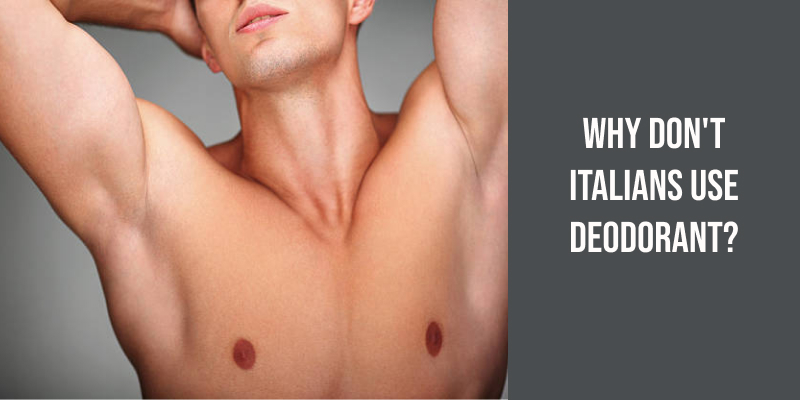The stereotype suggesting that Italians don’t use deodorant is not entirely accurate. It originates from differences in cultural habits, grooming routines, and personal hygiene products. In the past, strong personal fragrances were often associated with attempts to mask lack of cleanliness, which might have led to a preference for less noticeable scents. Italians traditionally have prioritized natural essence and may use different products like finely scented soaps, light fragrances, or lower-strength antiperspirants instead of strong, heavily scented deodorants. As a country known for its perfumes, taking care of personal smell is of paramount importance in Italy. Still, remember; today, the use of deodorant or not varies from person to person regardless of nationality.

Do Europeans Wear Antiperspirant?
However, it’s important to note that there may be cultural differences in how deodorant is used and perceived. For example, some cultures may place a greater emphasis on personal hygiene and grooming, while others may see body odor as a natural part of human interaction. In Europe, for example, it’s common to see a variety of deodorant brands and scents available in supermarkets and drugstores.
One factor that may influence deodorant use in Europe is climate. In regions with a cooler and more temperate climate, such as Northern Europe, people may not sweat as much and therefore may not feel the need to use antiperspirant. It’s also worth noting that physical activity, diet, and other lifestyle factors can also affect body odor and the need for deodorant.
Finally, it’s important to consider the role of cultural norms and values. In some cultures, there may be a greater emphasis placed on subtlety and avoiding strong scents, while in others, a more noticeable scent may be embraced.
Climate, gender, lifestyle factors, and cultural norms all play a role in determining whether someone chooses to use antiperspirant and what products they choose. Nonetheless, it’s safe to say that deodorant is a ubiquitous and important part of personal hygiene for many people around the world.
Do People in Italy Wear Deodorant?
Yes, people in Italy, like in many other countries, commonly wear deodorant as part of their personal hygiene routine. Deodorant is widely available in Italy, and it is used by both men and women to control body odor and maintain personal freshness.
Just like in any other culture, personal hygiene practices can vary among individuals in Italy. Some may prefer deodorants with different scents or formulations, while others may opt for natural or unscented options. The use of deodorant is considered a standard hygiene practice, and it is generally accepted and practiced by the majority of people in Italy as a way to stay fresh and comfortable throughout the day.
Some stores do carry it, particularly in urban areas and tourist hotspots. However, travelers may be surprised to find that the options available are limited. Many brands that are popular in other parts of the world may not be sold in Italy, and the ones that are available may be more expensive than what travelers are used to paying.
Travelers to Italy may want to pack their own ahead of time to ensure they’ve their preferred brand or type. This is because of cultural emphasis on natural and organic products, as well as a slightly milder climate that doesn’t often require it. However, travelers will still want to maintain their personal hygiene and could try finding alternatives like moist towelettes, or a small bottle of perfume or cologne.
It’s common knowledge that individuals across the world have diverse cultural and personal grooming practices that differ from country to country. However, one hygiene habit that’s been the subject of discussion is the usage of deodorant. While it may be perceived as a basic step in a daily shower routine for many, researchers have found that the British population has a different perspective.
Do British People Have Deodorant?
British people are known for their hygiene and cleanliness, and the use of deodorant is a standard part of their daily routine. According to research, this habit is deeply ingrained in British culture, and many Britons take great pride in smelling fresh and clean all day long.
However, this practice isn’t universal. In other parts of the world, people with a certain genetic variant are aware that they don’t smell and don’t use deodorant. This revelation has surprised many researchers, who’ve long assumed that the use of deodorant is a near-universal practice, regardless of culture or genetics.
In fact, there’s evidence to suggest that the use of deodorant is becoming even more widespread in Britain.
As personal hygiene is important for everyone, it’s surprising to know that a significant percentage of people still choose not to use certain hygiene products. According to a recent study, approximately 16% of people don’t use deodorant. Let’s further explore this topic to understand why and how this trend is affecting our society.
How Many People Don’t Use Deodorant?
According to a recent study, about 16% of people don’t use deodorant. This may seem like a low percentage, but it still amounts to a significant number of individuals who choose to forego this hygiene product. There are many reasons why someone might choose not to use deodorant. Some people simply don’t like the smell or texture of the product, while others may be concerned about the chemicals or ingredients in the deodorant they’ve tried.
For those who don’t use deodorant, body odor can be a concern. Without the antimicrobial agents in antiperspirant, bacteria can thrive in the warm, damp environment of the underarm. This can lead to an unpleasant odor that’s noticeable by others. Additionally, without the drying effects of antiperspirant, sweat can stain clothing and be uncomfortable for some individuals.
There’s growing concern about the potential health risks associated with everyday products, including deodorant. Some deodorants contain chemicals such as aluminum and parabens that have been linked to health issues including breast cancer and Alzheimers disease. For those who’re particularly concerned about these risks, natural alternatives like essential oils or crystal deodorants may be more appealing.
In some countries, it’s more common to forego deodorant, while in others it’s considered an essential part of personal hygiene.

The Difference Between Natural Deodorants and Conventional Deodorants
- Natural deodorants are made with natural ingredients and don’t contain harmful chemicals.
- Conventional deodorants often contain aluminum and other synthetic chemicals that have been linked to health concerns.
- Natural deodorants may be less effective at preventing sweat and odor, but may provide a safer, more natural alternative.
- Conventional deodorants are often more effective at preventing sweat and odor, but may come with risks to health.
- Overall, the choice between natural and conventional deodorants is a personal one based on individual preferences and priorities.
Source: Study: 16% of people don’t use deodorant wcnc.com
Now, let’s take a closer look at the habits and preferences of German consumers when it comes to deodorants. While some may assume that Germans don’t place a high emphasis on personal hygiene or grooming, the popularity of deodorants suggests otherwise. So, do Germans wear deodorant? Read on to find out.
Do Germans Wear Deodorant?
However, there’s a common myth that Germans don’t use deodorant. This erroneous belief has been spread widely in popular culture. Some people believe that Germans have a different sense of hygiene and that they don’t have a problem with body odor.
Germans tend to be more private and reserved than people from other cultures, and they don’t like to draw attention to themselves.
Therefore, if you ever plan to visit Germany, don’t forget your deodorant.
Conclusion
While it’s true that some Italians may not use deodorant due to personal preference or cultural traditions, it’s important to recognize that personal hygiene practices vary widely across individuals and cultures. Moreover, it’s crucial to avoid making sweeping generalizations about entire populations based on incomplete or inaccurate information. Ultimately, one’s decision to use deodorant is a personal choice that should be based on individual preferences, needs, and cultural norms, rather than stereotypes or preconceived notions. By challenging and dispelling stereotypes about personal hygiene practices, we can promote greater understanding and respect across cultures.





